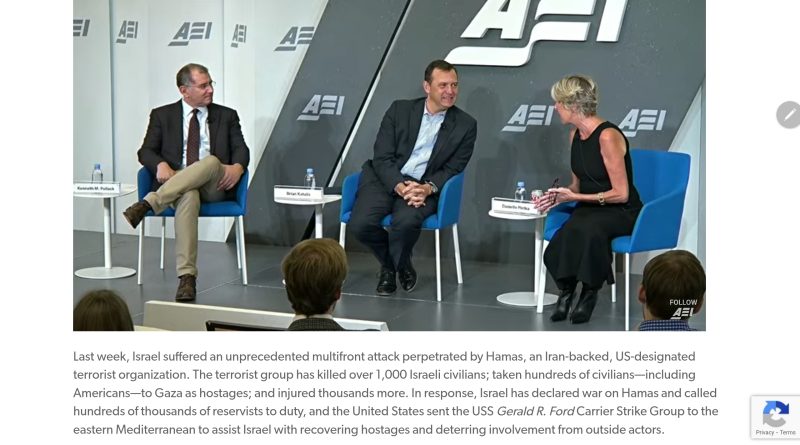‘Nation Building’ of Gaza the Apparent Broad Objective of Israeli Policy Amid Conflict, Former CIA Analyst Tells AEI
ABOVE PHOTO: Kenneth Pollack (far left), Brian Katulis and an AEI moderator at the American Enterprise Institute, in an Oct. 16, 2023 Washington program entitled, “Discussing the Trajectory of the War in Israel.” (STOP THE PRESSES — UK COLUMN SCREENSHOT )
By Mark Anderson
STOP THE PRESSES! News Association
WASHINGTON, D.C. – Former CIA Persian Gulf military analyst Kenneth M. Pollack, speaking Oct. 16 for a program of the American Enterprise Institute (AEI), a notoriously neo-conservative Washington think tank, bluntly advocated “nation building” for Gaza, meaning that war-torn strip of Palestinian land would be even more beholden to the dictates of Israel and the United States. The implication is that any remnants of Palestinian self-determination would be highly degraded if not eliminated altogether.
Pollack, a Jewish resident scholar at AEI, served on the National Security Council and formerly worked for the pro-Israeli Saban Center of the Brookings Institution—one of several globalist tax-exempt policy “advising” outfits located along Washington’s noted “think tank row” on Massachusetts Avenue. Brian Katulis, senior fellow and vice president of policy at the Middle East Institute, also spoke and gave a somewhat more balanced view of the Israeli-Hamas-Palestinian turmoil, although the overall program was noticeably biased in favor of Israeli interests.
The moderator, AEI senior fellow Danielle Pletka, made no secret of her Jewish heritage while casting aspersions on the Palestinians in a dehumanizing tone as she interviewed Pollack and Katulis for a program—covered live online by this writer for UK Column—entitled, “Discussing the Trajectory of the War in Israel,” a curious tag that omits the fact that most of the destruction is in the Gaza Strip, a Palestinian enclave nearly the size of Manhattan that’s one of the most densely populated areas in the world; hence its extreme vulnerability to brutal Israeli airstrikes.
KEY POINTS
Pollack claimed at the time that while the risks of escalation of hostilities “are lower than many believe,” a statement that he didn’t substantiate, and although Iran is reluctant in his estimation to mess with Israel, he believes Hamas will “fight to the last Palestinian, and to the last Hezbollah—they’ll do that.” Iran, Pollack added, did not order Hezbollah to join in the initial attack against Israel on Oct. 7. He further opined that while Hezbollah may assume it can inflict enough casualties to get Israel to back down, that Lebanese political party and militant group, which has a paramilitary wing, is no match for Israel.
For his part, Katulis, who also previously served on the National Security Council, likened the date of the reported initial attack on Israel to America’s 9-11: “What happened on ‘10-7’” was analogous to “9/11,” he remarked.
He did add, however:
You can’t have normalization deals that ignore the millions of Palestinians who live there.
Meanwhile, Pollack argued that Israel can and should handle the overall situation one thing at a time—taking care of Gaza first. “Israel doesn’t want to deal with Iran; they want to focus on Gaza,” he stated.
To which Katulis replied, “Sixteen years of [Israel] closing off Gaza will bring a reckoning.” Katulis then added: “The Palestinian Authority may have mistreated and deceived the Palestinians.”
Which brought Pollack to his core point: The objective must be for Israel and its military to put Gaza first—despite the constant claims of Israel and its allies that Hamas, Iran, Hezbollah, Syria and other antagonists are tightly intertwined and act in concert as an all-encompassing enemy—and “defeat Hamas and engage in nation-building in Gaza.”
That, Pollack continued, involves “building a different Gaza with a different leadership.” He floated the idea that there could still be a “two-state solution” that somehow would be reconcilable with Gaza’s foes rebuilding Gaza. Staking his claims on Israel being largely if not totally beyond reproach, he added:
Hopefully, Hamas will be destroyed . . . . Different models have been used for nation-building [with the UN as a likely participant]. It will take a long time.
Indeed, why would the Palestinians object to “a different Gaza” with “different leadership” if, as moderator Ms. Pletka suggested, “the Palestinian plight is the fault of Hamas?” She then likened the proposed “nation-building” of Gaza to what the conquering allied forces did in the aftermath of World War II to rebuild and politically reorient Germany [Italy was mentioned, too].
Besides, starting over with Gaza makes sense to Ms. Pletka because, as she cavalierly stated, “Gaza is a floating bubble of terrorism out there that no one cares about.” And Katulis, while he had a more conciliatory tone about the Palestinians and did not shield Israel from some criticism, still echoed the unsubstantiated claim that Hamas murdered babies in Israel, among other alleged atrocities that, we’re told, sparked a wider war.
This is how the nation’s plutocratic think tanks, which act as policy incubators and co-mingle “former” intelligence personnel with sundry scholars, and current and former politicians, reveal what’s likely in store for Gaza: Conquerors calling the shots after the shooting subsides. Would that really result in a “two-state solution,” or is a one-state arrangement masquerading as two in the works?



